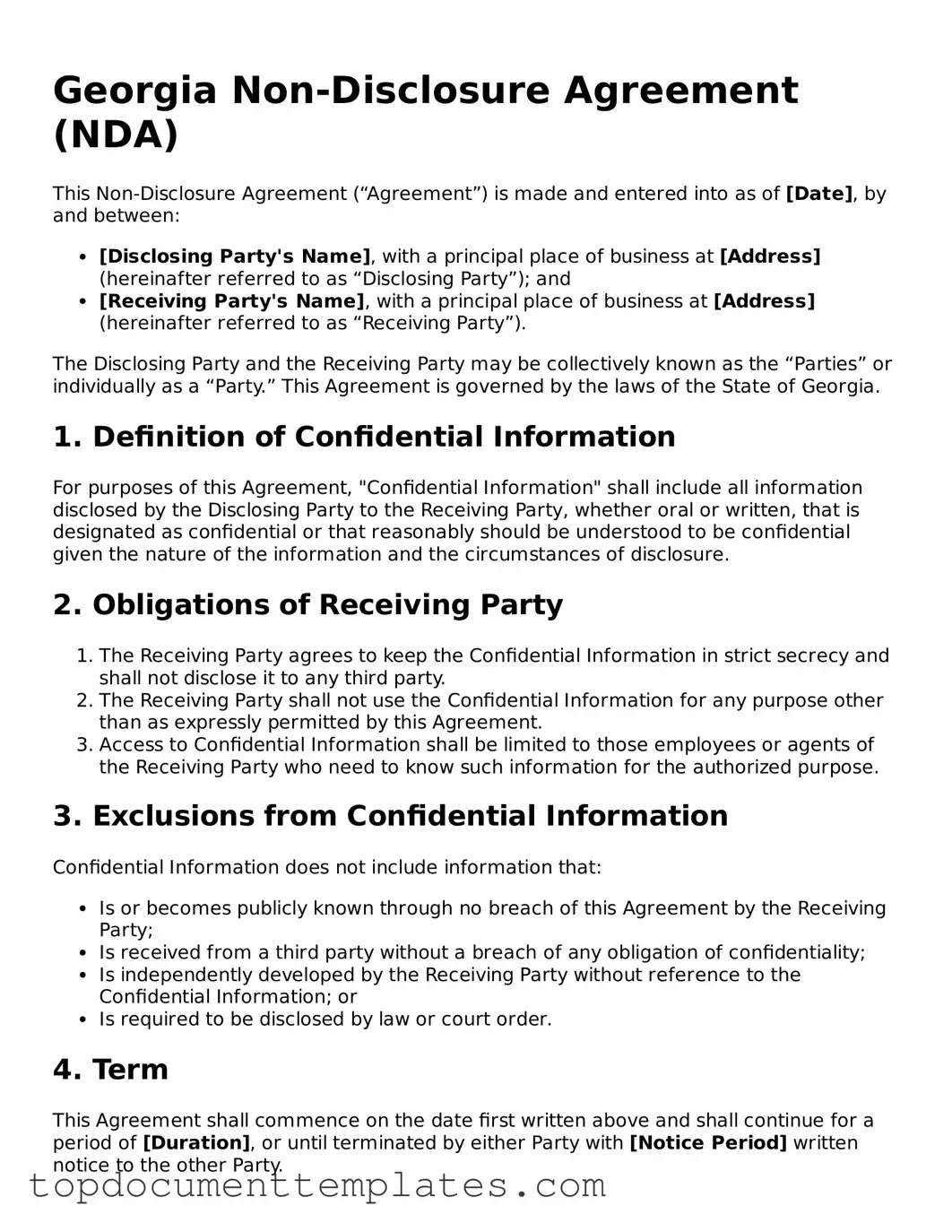Valid Non-disclosure Agreement Form for Georgia State
In the realm of business and professional relationships, confidentiality plays a crucial role in safeguarding sensitive information. The Georgia Non-disclosure Agreement (NDA) form serves as a vital tool for individuals and organizations seeking to protect their proprietary data, trade secrets, and other confidential materials. By establishing clear terms and conditions, this agreement ensures that parties involved understand their obligations regarding the handling and sharing of sensitive information. Key elements of the Georgia NDA include the definition of confidential information, the duration of the confidentiality obligation, and the specific circumstances under which information may be disclosed. Additionally, the form outlines the consequences of breaches, reinforcing the importance of trust in business dealings. Whether you are a startup looking to secure your innovative ideas or an established company aiming to protect your intellectual property, understanding the nuances of the Georgia Non-disclosure Agreement is essential for fostering a secure and collaborative environment.
Similar forms
Confidentiality Agreement: Similar to a Non-disclosure Agreement, this document protects sensitive information shared between parties. Both agreements aim to keep information private and limit its disclosure.
Mutual Non-disclosure Agreement: In this case, both parties agree to protect each other's confidential information. This is essential when both sides will share sensitive data.
Employment Agreement: Often includes confidentiality clauses to protect company secrets. Employees agree not to disclose proprietary information during and after their employment.
Partnership Agreement: This document may contain confidentiality provisions. Partners must protect each other's business strategies and sensitive information.
Service Agreement: When a service provider is hired, this document can include confidentiality terms. It ensures that the provider does not share the client’s sensitive information.
Licensing Agreement: When one party licenses its intellectual property to another, confidentiality clauses often apply. These clauses protect proprietary information from being disclosed to third parties.
Settlement Agreement: In legal disputes, these agreements often include confidentiality terms to prevent the disclosure of settlement details.
Research Agreement: When collaborating on research projects, these agreements can include confidentiality provisions to protect sensitive data and findings from being shared publicly.
Guidelines on Writing Georgia Non-disclosure Agreement
Once you have the Georgia Non-disclosure Agreement form in hand, it’s time to fill it out carefully. Completing this form accurately is essential for ensuring that all parties involved are on the same page regarding confidentiality. Follow these steps to ensure that you fill out the form correctly.
- Start by entering the date at the top of the form. This will help establish the timeline for the agreement.
- Next, fill in the names of all parties involved in the agreement. Make sure to include both the disclosing party and the receiving party.
- Provide the addresses for each party. This information is crucial for any future correspondence related to the agreement.
- In the designated section, clearly outline the specific information that will be considered confidential. Be as detailed as possible to avoid any misunderstandings later on.
- Next, specify the duration of the confidentiality obligation. Indicate how long the receiving party must keep the information confidential.
- Look for any additional clauses or sections that may need to be filled out. This could include terms about the return of confidential information or any exclusions to the agreement.
- Finally, ensure that all parties sign and date the form. Signatures are essential to validate the agreement.
After completing these steps, you’ll have a fully executed Non-disclosure Agreement ready for use. Make sure to keep a copy for your records and provide copies to all parties involved.
File Information
| Fact Name | Description |
|---|---|
| Purpose | The Georgia Non-disclosure Agreement (NDA) is designed to protect confidential information shared between parties. |
| Governing Law | This agreement is governed by the laws of the State of Georgia. |
| Parties Involved | The NDA typically involves at least two parties: the disclosing party and the receiving party. |
| Definition of Confidential Information | The NDA should clearly define what constitutes confidential information to avoid ambiguity. |
| Duration of Confidentiality | The agreement specifies how long the confidentiality obligation lasts, which can vary depending on the nature of the information. |
| Permitted Disclosures | Certain disclosures may be allowed, such as those required by law or court order. |
| Consequences of Breach | Breaching the NDA can lead to legal consequences, including potential financial damages. |
| Return of Materials | The NDA may require the receiving party to return or destroy any confidential materials upon termination of the agreement. |
| Non-Compete Clause | Some NDAs may include a non-compete clause, restricting the receiving party from using the information to compete against the disclosing party. |
| Enforceability | For an NDA to be enforceable in Georgia, it must be reasonable in scope and not overly restrictive. |
Other Popular Non-disclosure Agreement State Forms
Petition for Nondisclosure Texas - Enhance the security of your innovations with a formal Non-disclosure Agreement.
Non Disclosure Agreement Arizona - Confidentiality is paramount in industries with sensitive data like tech or finance.
